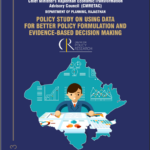
Empowering communities through data and supporting them with technology
4 September 2012
The PAISA project since its inception in 2009, has been tracking the flow of funds of social sector schemes as well as studying the decision-making mechanisms involved in their implementation. From the very beginning, we were clear that our research should not be an entity by itself, where we simply collect data for the sake of research. Rather, we were interested in trying to understand how data can be used to enable and empower communities and individuals. Thus, our concerted focus (or rather, comprehension) has not been on the data itself, but rather how to use data and associated technologies in evolving communities.
Through PAISA, AI works with broadly three types of local communities
– Our field associates working in 9 districts in 7 states across the country. They are being trained to become experts in local governance, and our idea is for them to ultimately provide research-based inputs that will effect in the better functioning of social sector schemes in their district.
– Larger communities of local governance expert such as elected Panchayat members, SMC members and so on, who we believe are critical to accountable delivery of services.
– A much larger community of actual recipients of public services such as parents of school-going children and so on (I won’t be talking about them in this blog post).
Community of field associates: Our field associates come from 9 districts in 7 states of the country. Most of these are rural districts except for Hyderabad which is an urban district. To grow into their roles as research-driven local governance experts, our associates need to know how to extract data from these rural ecosystems. This is not an easy task. Open data about the implementation of Sarva Shiksha Abhiyan (to cite) and the planning decisions that go into its implementation, are spread across different levels of the government – central, state, district, block and schools. Consolidated data that gives a complete picture across all levels is not available, and it is through a critical process of developing relations with officials, convincing them of the usefulness of having a consolidated picture, and using the RTI that we and the associates are able to collate this data. As Gurstein points out in his editorial in the Journal of Community Informatics, regarding Transparency Chennai’s experiments of developing a list of public toilets in Chennai(who has also incidentally blogged about it on our blog) – “Open Government data(OGD) in developing economies is not a neutral output to be reconfigured, analyzed and displayed (through apps). Rather OGD is an artifact in itself to be analysed, accredited, authenticated and ultimately something to be created as an output of a significant process requiring legal support (as for example through RTI legislation), technical and forensic skill, persistence and ultimately courage.”. It is a point that is brought out by our experiments with Open Government data.
To support this community of field associates, we have put in place two strategies – one is the development of a participatory course, where through intensive, collaborative modules on the creation of content, their incorporation into practice, reports of what works and what doesn’t, mind-maps based brainstorming and detailed discussions, the associates learn and grow into their roles; the other is the development of a ICT-based sharing platform, (which the associates have appropriated as their own platform) where the associates share daily life happenings and consequently develop a shared vocabulary, something that was not possible earlier while they were in their respective districts.
Larger community of local governance experts: The larger communities of local governance experts we are building are spread across districts beyond those of the PAISA field associates talked above. These include districts in far-flung Kutch and Rajasthan. The community members, some of them Panchayat members, some SMC members and other Panchayat committee members are all technology-enabled (also called TELPEs) in that they can use ICT based platforms to interact with TELPE’s in other regions.
One of the main problems faced by these members lie in their capacity to perform their roles, as the training they get is barely enough. Training is provided in packages of 3 to 4 days and are rarely thorough enough given the vast range of duties they are expected to perform. Rajesh Tandon and Kaustuv Kanti Bandyopadhyay in this paper argue that “training of individuals is (often) seen as the sine-qua-non of capacity building through some pre-determined package of inputs. However, capacity building comprises of a variety of other approaches and processes such as, organizational strengthening, institutional learning, exposure, horizontal sharing and solidarity are some of the other illustrations of practical, hands-on and experiential learning processes to capacity building”. I would argue that this kind of capacity building involves “messy data” such as stories, voice bytes, videos and so on.
It is to encourage this kind of messy data sharing that we have developed the strategic practice of organising regular sharing sessions between various local governance experts (including our PAISA field associates). 2-3 hour long sharing sessions are held where stories, questions, solutions to problems and structured presentations are shared, followed by a detailed question-answer session. TELPE’s from far-flung villages congregate at a local internet-enabled centre from which they skype with other TELPE’s across the country. In addition to video and voice sharing, our TELPE’s use social networking platforms to quiz each other on local governance issues so as to reinforce core concepts.
Though the use of ICT based platforms is common to both the communities we are working with the strategies used by each and the way the technology has been appropriated by each community has been different. A similar story is seen in the case of data – while one community is creating Open Government Data which has not been created before, the other is using messy data to empower themselves to perform their roles better.





